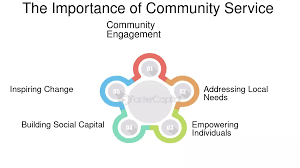In July 2025, competition for scholarships, especially in Canada and other developed countries, has become tougher. While good grades are still important, scholarship committees now also consider the whole character of applicants. Community service is one of the key non-academic factors that affect scholarship chances.
Community service demonstrates a student’s commitment to social responsibility, leadership, and civic engagement. These qualities are now being heavily weighted by scholarship panels, as they reflect a candidate’s potential to contribute meaningfully to society beyond the classroom.
Building a Stronger Application Profile
Including community service in a scholarship application gives it a strong edge. Applicants who can showcase consistent involvement in volunteer work—whether it’s tutoring younger students, helping at food banks, or organizing environmental cleanups—stand out as socially aware and proactive individuals.
Admissions officers and scholarship boards often review hundreds or thousands of applications. When academic records are similar, what sets one student apart from another is often their community impact. Volunteering tells reviewers that the student doesn’t just work for personal success but contributes to collective well-being.
Demonstrating Leadership and Initiative
Many scholarships, particularly those offered by government agencies or large organizations, are designed to support future leaders. By participating in community service, students show initiative, dedication, and problem-solving skills—traits that are essential in leadership roles.
If a student has not only volunteered but also led a project or coordinated a campaign, that adds even more weight to their profile. Leading a youth mentorship group or starting a recycling program, for instance, shows both responsibility and vision.
These activities provide real-world examples of leadership in action, which scholarship panels often value more than abstract statements or recommendations.
Enhancing Personal Growth and Maturity
Volunteering helps students grow personally and emotionally. It builds empathy, improves communication, and teaches time management—all of which are traits that scholarship committees consider when evaluating applicants.
For students applying for scholarships in fields like healthcare, education, or public policy, demonstrating compassion and a desire to serve others becomes especially critical. Through community service, students gain exposure to real-world challenges and diverse communities, shaping them into well-rounded candidates.
Maturity and a service-oriented mindset often emerge from these experiences, which enhances the applicant’s readiness for higher education and public life.
Aligning with Scholarship Values and Missions
Many scholarships are tied to organizations with specific missions or values. For example, a scholarship offered by a nonprofit that supports underprivileged communities will naturally favor candidates who have served similar populations.
Applicants who align their volunteer work with the goals of the scholarship provider show a deeper connection and shared purpose. This alignment signals to reviewers that the student not only meets the criteria but also reflects the spirit of the award.
Being intentional with volunteer choices can thus significantly increase the chances of winning mission-based or cause-driven scholarships.
Improving Interview Performance and Essay Content
Scholarship interviews and personal essays often ask applicants to discuss a time they faced a challenge, made an impact, or grew as individuals. Community service experiences provide rich and compelling content for these sections.
A student who has volunteered extensively will have more real-life stories to draw from, which makes their responses more authentic and persuasive. Whether describing how they helped organize a fundraiser or worked with at-risk youth, applicants can present examples that reveal their values and motivation.
Authentic stories based on community involvement often resonate more with scholarship judges than generic academic achievements.
Meeting Eligibility Criteria for Specific Awards
As of 2025, many scholarships now list community service as an official eligibility requirement. Canadian awards like the TD Scholarships for Community Leadership or the Loran Scholars Foundation prioritize applicants who have made tangible contributions to their communities.
Other regional and school-based scholarships also give preference to students with documented volunteer hours. Without fulfilling these criteria, students may be disqualified regardless of their grades or test scores.
Keeping a log of service hours and obtaining verification letters from supervisors can be vital for meeting these application requirements.
Building a Network of Support and Recommendations
Community service often puts students in contact with mentors, nonprofit leaders, and local officials. These connections can provide powerful letters of recommendation when applying for scholarships.
Unlike school teachers or academic counselors, community leaders may highlight different aspects of the student’s character—like work ethic, perseverance, or ability to lead others in real-life situations.
Such well-rounded recommendations strengthen the application and offer a broader perspective on the student’s potential, giving them a competitive edge in selection processes.
Creating a Lasting Impact Beyond the Scholarship
The value of community service doesn’t end with winning a scholarship. Students who develop the habit of giving back often continue to contribute in university and professional life. This ongoing commitment to service enriches their personal identity and strengthens their career prospects.
Universities today are also placing more emphasis on civic engagement as part of their core mission. Students who have a track record of service are more likely to be invited to exclusive programs, leadership councils, and internships.
The ripple effects of early community involvement go far beyond financial aid—they shape a lifetime of purpose-driven living.
Conclusion: Service as a Pathway to Scholarship Success
In today’s competitive academic environment, community service is more than a nice addition—it’s a fundamental component of scholarship eligibility. It reveals a student’s leadership potential, social awareness, and readiness to contribute to society.
As of July 2025, students who embrace volunteerism and take an active role in their communities not only build stronger applications but also develop into thoughtful, responsible citizens. For any student aiming to secure scholarships, community service is not just a requirement—it’s an opportunity to stand out and make a difference.



